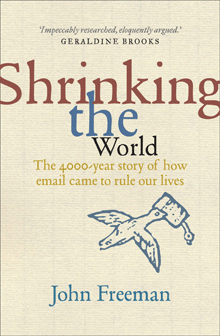Review of Shrinking the World by John Freeman

The average office worker receives 200 emails a day and spends 40% of their working day reading or responding to emails. Within 14 months there will be 3.2 billion email users on the planet.
In 1929 there were 20 million telegrams sent; the equivalent today would be 80 million telegrams a year; by contrast we send 600 million emails every 10 minutes!
What are the consequences of this exponential increase in communications? John Freeman has considered this question, and come to the conclusion that there are dire consequences for the way we are speeding up the receiving and sending of messages.
He begins his book with the first example we have of written communication. It is a clay tablet on which was written a love poem. Freeman points out that the lover would have collected the clay, moulded the tablet, composed and written the words, then baked it, and delivered it. It is a process that would have taken days, perhaps weeks depending where the recipient lived.
By contrast, we can send a love message in seconds anywhere in the world. Freeman warns however, that some matters, such as love, require deliberation.
Email has irrevocably changed our world.
Firstly, it is all about speed, and this is at the loss of comprehension. We tend to transmit rather than create, we scan and skim rather than understanding deeply. Studies show that most people now tend to skip large blocks of text. We prefer bullet points and visual clues, such as bold, CAPITALS, or italics.
Secondly, it is all about a virtual world, whereas we need the physical world. Freeman points to studies that show that 50% of emails are misunderstood because there are not the verbal or visual cues that give meaning. It is too easy to email, when face-to-face usually takes more courage, especially when meeting new people, or delivering uncomfortable messages.
Thirdly, we have become used to getting chunks, rather than reading in context. In doing this we can make mistakes, since context is vital for understanding. We also miss the interconnectedness of ideas.
While Freeman's book is mostly about email, this is already passé for those under 40, who are far more into social networking. Freeman also touches on this area with his comment that the technology allows us to create our own identity. While we are communicating more about ourselves, we are actually revealing less. In the virtual world we can mould an image which is unsustainable face-to-face. In fact, social networking promotes even more shallow communication and is even more time consuming.
While Freeman does not touch on the spiritual, there are clear lessons from his message. As the speed of information transfer has sped up, so has the pace of life. Our expectation is to receive things fast, in juicy chunks, and the focus is on me. Spiritually, this can lead to a shallow relationship with God, focused on my experience of God.
The challenge from Freeman is to SLOW DOWN, and in the spiritual sphere this means taking the time to explore relationship with God, and to focus on our spiritual community.
So, how do we control the email menace? Freeman has 10 quick tips:
1. Don't send = unless you really need to!
2. Don't check email first thing in the morning or last thing at night, because it has an impact on your brain and affects your ability to focus, or sleep.
3. Check it just twice a day, which means turning off the "you got mail" beep.
4. Keep a written "to do" list, with email included on it; so you keep a focus on all your work and don't get diverted by email.
5. Give good email = which means short messages, and indicate when no response is required.
6. Read the entire incoming email, before replying = a simple rule, but most of us fail to do this and it really affects comprehension.
7. Do not debate complex or sensitive matters by email = it is too easy to misunderstand or offend.
8. If you work as a group, meet face-to-face = studies show this more effective than via email.
9. Set up your desk to do something other than email = don't let the machine dominate/control your life.
10. Schedule screen-free time every day = you will sleep better, communicate more with those you live with, and have more time to learn something new or read a book ☺ We need to relearn how to exercise control rather than reacting.
This is a really well-written book and a timely warning.
The irony is that email was meant to make life more efficient so we could spend more time with family and friends; instead it has allowed work and the virtual world to intrude into our homes, and steal time away from friendships.
We need to be more intentional about our communicating.
KARA MARTIN is a lecturer with School of Christian Studies (www.socs.org.au), and is an avid reader and book group attendee. Kara does book reviews for Hope 1032's Open House (www.theopenhouse.net.au).




























